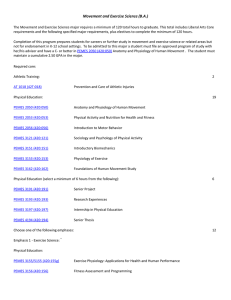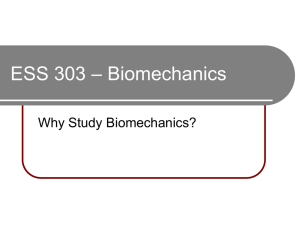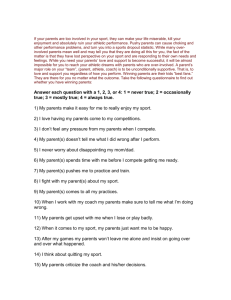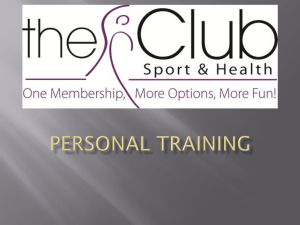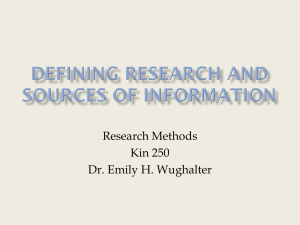Department of Kinesiology, Sport Studies and Physical
advertisement
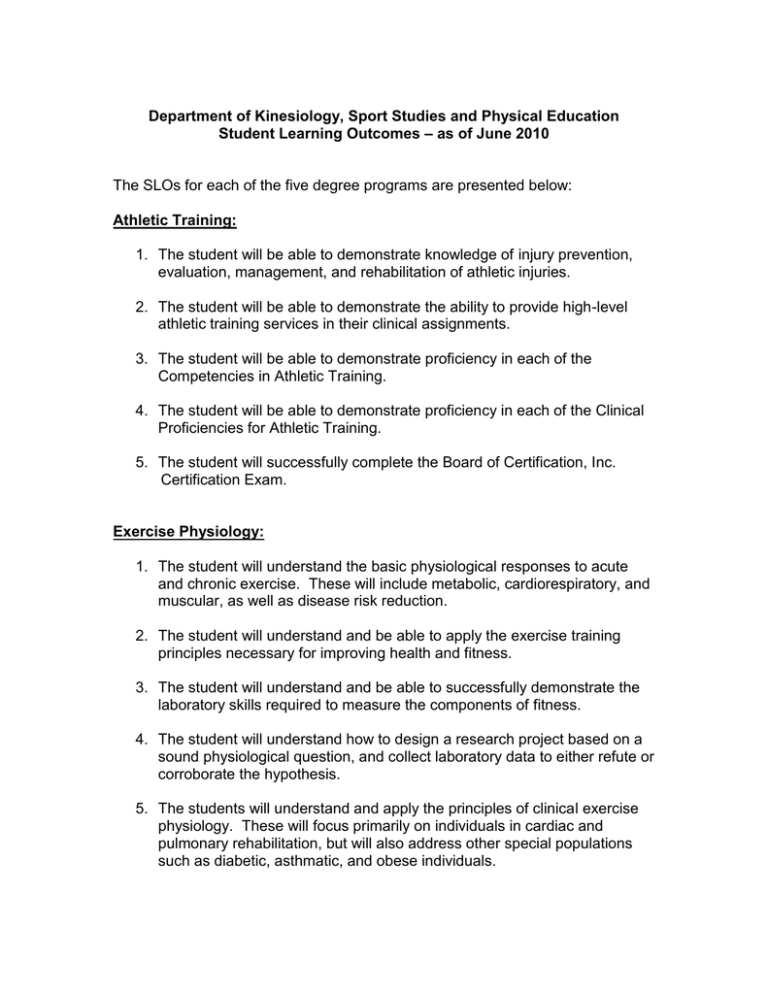
Department of Kinesiology, Sport Studies and Physical Education Student Learning Outcomes – as of June 2010 The SLOs for each of the five degree programs are presented below: Athletic Training: 1. The student will be able to demonstrate knowledge of injury prevention, evaluation, management, and rehabilitation of athletic injuries. 2. The student will be able to demonstrate the ability to provide high-level athletic training services in their clinical assignments. 3. The student will be able to demonstrate proficiency in each of the Competencies in Athletic Training. 4. The student will be able to demonstrate proficiency in each of the Clinical Proficiencies for Athletic Training. 5. The student will successfully complete the Board of Certification, Inc. Certification Exam. Exercise Physiology: 1. The student will understand the basic physiological responses to acute and chronic exercise. These will include metabolic, cardiorespiratory, and muscular, as well as disease risk reduction. 2. The student will understand and be able to apply the exercise training principles necessary for improving health and fitness. 3. The student will understand and be able to successfully demonstrate the laboratory skills required to measure the components of fitness. 4. The student will understand how to design a research project based on a sound physiological question, and collect laboratory data to either refute or corroborate the hypothesis. 5. The students will understand and apply the principles of clinical exercise physiology. These will focus primarily on individuals in cardiac and pulmonary rehabilitation, but will also address other special populations such as diabetic, asthmatic, and obese individuals. 6. The student will be able to communicate and apply the principles of exercise physiology such that they are prepared for employment within clinical exercise physiology, the fitness industry, corporate fitness, sport research centers, or graduate work. Kinesiology Major: 1. The student will demonstrate understand psychosocial and physical scientific foundations of physical activity. 2. The student will demonstrate an understanding of philosophical and historical context of physical activity. 3. The student will demonstrate an understanding of physical activity in health, wellness, and quality of life. 4. The student will engage in skillful activity and be knowledgeable of the mechanics, physiology, and principles of moving skillfully and acquiring skillful movement. Physical Education Teacher Education (PETE): 1. Teacher education candidates will know and apply discipline – specific scientific and theoretical concepts critical to the development of physically educated individuals 2. Teacher education candidates will have the knowledge and skill necessary to demonstrate competent movement performance across a number of sport skills 3. Teacher education candidates will have the knowledge and skill necessary to demonstrate health enhancing fitness 4. Teacher education candidates will be able to plan and implement developmentally appropriate learning experiences aligned with state and national standards in order to appropriately address the diverse needs of all students 5. Teacher education candidates will be able to use effective organizational, communication and pedagogical skills and strategies to enhance student participation 6. Teacher education candidates will be able to utilize assessments and reflection to foster student learning and to inform instructional decisions 7. Teacher education candidates will demonstrate dispositions essential to becoming effective professionals. Sport Management: 1. The student will be able to identify, explain, and apply appropriate principles of marketing, promotion and fundraising. 2. The student will demonstrate an understanding of administrative practices in sport management. 3. The student will be able to identify, explain and apply appropriate principles of problem solving (prevention) for one or more problems, challenges and difficulties associated with a specific sport management entity (organization). 4. The student will be able to demonstrate a body of knowledge and an awareness of sport management knowledge and practices indicative of one who is competent to enter the workforce within the business of sport by satisfactorily responding to questions (pertaining to managing the business of sport) that are presented by sport management experts in a professional setting.
